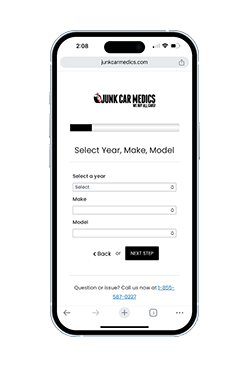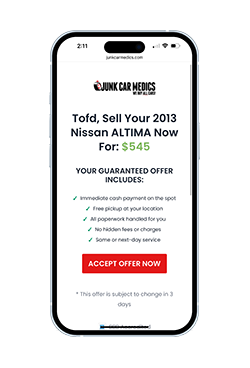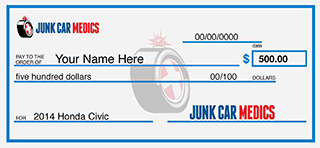Get Your Instant Offer
Sell Your Car for Cash
Selling your car for cash should be simple. At Junk Car Medics, we make it that way. Whether your vehicle is used, old, high-mileage, or junk, we give you a guaranteed offer and free pickup. No lowballing. No games. Just real offers and fast payments.
We buy:
- Used cars
- High-mileage vehicles
- Damaged or wrecked cars
- Non-running vehicles
- Cars with mechanical problems
- Salvage and junk cars
Wherever you are, we help you sell your car for cash the right way.
How to Sell Your Car Online for Cash
Sell your car online or by phone as fast as today with Junk Car Medics. Here's how it works
-
Step 1: Submit Vehicle Details
Tell us your vehicle’s year, make, model, mileage, and condition.
-
Step 2: Receive Instant Quote
We evaluate your vehicle based on condition, demand, and the local market. Get your offer by online or by phone in minutes.
-
Step 3: Schedule Free Pickup
Choose a convenient pickup window that works for you. We offer same-day and weekend pickups. We'll tow your vehicle for free from anywhere.
-
Step 4: Get Paid Cash
When we arrive, we inspect the vehicle, complete any paperwork, and pay you cash or check on the spot in exchange for your keys. No delays. No fees. No surprises.
How Much Can I Sell My Car for?
Car values vary depending on multiple factors. These include:
- Vehicle age, mileage, and condition
- Market demand for your make and model
- Whether it’s driveable or has valuable parts (like a catalytic converter)
- Metal prices, for older or junk vehicles
\We pay anywhere from $300 for junk cars to $10,000 or more for used and repairable vehicles. Your instant offer reflects your specific car’s real market value.
Here are recent payments we made to sellers:
Why Sell Your Car With Us?
Our car buying service is the fastest way to sell a vehicle for money. We're not a dealership, and we're not a lead service. We are a national network of direct buyers who offer fair pricing and stress-free service.
- Top offers based on real-time market data
- No fees for pickup, quotes, or processing
- Same or next-day removal
- Licensed and insured buyers
- Thousands of 5-star reviews
- A+ BBB Rating for trust and transparency
We’ve helped over 75,000 people sell their cars for cash. Let us help you next.
Sell Your Car Online From Anywhere in the US
One of the great benefits of our car buying service is it allows you to sell your car online from anywhere in the US. We service the entire nation, coast to coast. Top cities include:
- Sell my car online in Charlotte
- Sell my car online in Chicago
- Sell my car online in Dallas
- Sell my car online in Detroit
- Sell my car online in Houston
- Sell my car online in Los Angeles
- Sell my car online in Milwaukee
- Sell my car online in Philadelphia
- Sell my car online in Phoenix
- Sell my car online in Tampa
Get Your Instant Offer Now
Ready to sell your car for cash? Get a no-obligation offer in minutes and have your vehicle picked up for free. Fast cash, no hassles, and no pressure.




